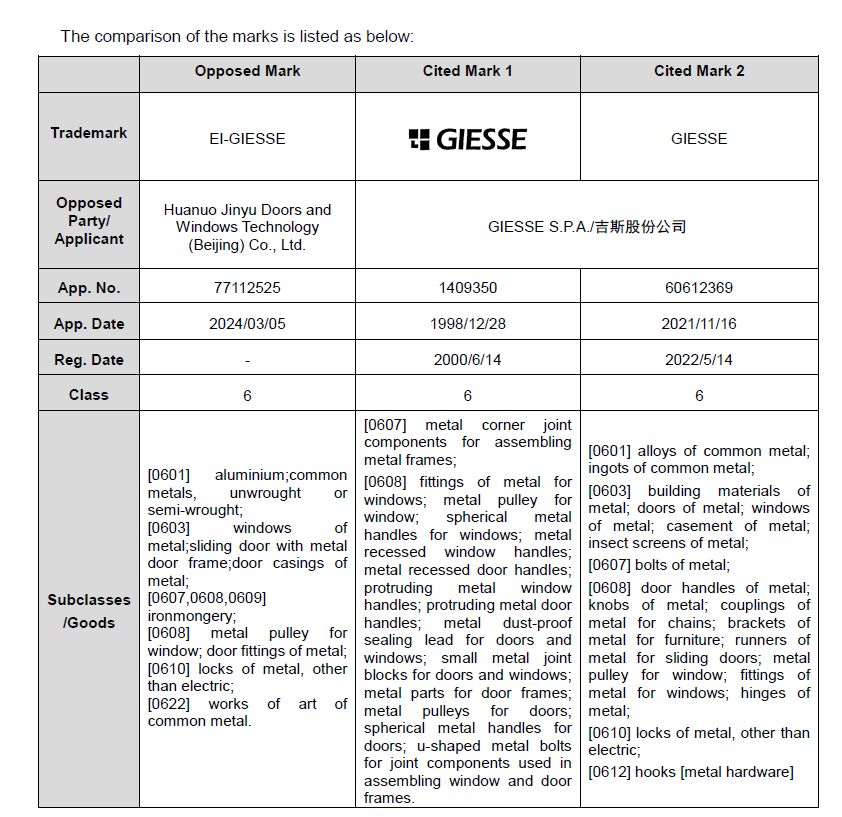- in China
- within Consumer Protection topic(s)
Abstract
We, Kangxin Partners, P.C., filed an opposition action against the trademark, EI-GIESSE (No. 77112525 in Class 6) ("the opposed mark") on behalf of GIESSE S.P.A./吉斯股份公司 ("client") on August 26, 2024. The National Intellectual Property Administration, PRC ("CNIPA") examined the case and decided to reject the opposed mark for registration over the similar goods.
Backround
The client is a globally recognized manufacturer of hardware
accessories for doors and windows and has registered the trademarks
" ![]() " and "GIESSE" in
mainland China for various goods, including those in Class 6. The
client's trademark "GIESSE" is highly
distinctive.
" and "GIESSE" in
mainland China for various goods, including those in Class 6. The
client's trademark "GIESSE" is highly
distinctive.
The client was of the opinion that the opposed mark is a "similar mark over similar goods" compared with their prior registered marks. We were entrusted to file opposition against this mark.

Key Issues
In the opposition, we mainly argued that:
1) The opposed mark and the cited marks constitute the "similar marks over the similar goods". According to Article 30 of China Trademark Law, the opposed mark should not be approved for registration;
2) In light of the high reputation of the client and the cited marks, the registration and use of the opposed mark will easily cause confusion and misunderstanding amongst the consumers;
3) The opposed mark was filed without the intention to use, but with bad faith and by improper means, in violation of the Articles 4, 7, and 44 of China Trademark Law.
On May 21, 2025, the CNIPA issued the decision and rejected the opposed mark, EI-GIESSE (App. No. 77112525) for registration over the similar goods in Subclasses 0601, 0603, and 0607-0610, reasoning that:
The opposed mark fully includes the composed letters in the cited marks "GIESSE." The rejected designated goods of the opposed mark are similar to those of the cited marks in respect to function, way of use, and sales places. The coexistence of the two marks will cause confusion and misleading to the relevant public. Thus, the marks constitute "similar marks over the similar goods," in violation of Article 30 of China Trademark Law.
Key Point of the Case
The key issue of this case is that 1) the opposed mark is a "similar mark" with the cited marks; 2) the goods of the opposed mark are partially similar to those of the client's cited marks, and 3)the opposed party maliciously registered the mark without the use intention, which constitutes obtaining the trademark registration by improper means and violates the principle of good faith.
With respect to issue 1, obviously, the opposed mark is similar to the cited marks, because it fully contains the client's distinctive word mark, so they are similar in respect of composing letters, visual effect and pronunciation. The opposed mark and the cited marks do not have specific meanings, therefore they can't be distinguished from each other in meaning either.
With respect to issue 2, according to the Chinese Classification of Goods and Services, the goods of the opposed mark are partially similar to the goods of the cited marks.
With respect to issue 3, it is clear that the examiner did not support our claim. In fact, we have recently handled several similar cases under the same entity, such as YDL-GIESSE. In these opposition cases, the examiners supported our claim that the opposed party had maliciously registered someone else's trademark. However, in this particular case, the CNIPA did not support this claim. This is why we often advise applicants to file invalidation again for cases not supported by the CNIPA. Different examiners may have slightly different standards when reviewing cases. Even for the same case, different examiners may have different judgments regarding the similarity of trademarks, which is why we often say that the assessment of trademark similarity is subjective. Just because our opposition case was not supported by the CNIPA does not mean that an invalidation case will not be supported either. Agents should still provide applicants with more opinions based on the actual situation to protect the prior rights of the actual trademark owner.
The content of this article is intended to provide a general guide to the subject matter. Specialist advice should be sought about your specific circumstances.
[View Source]

